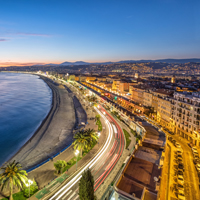Moving to French Riviera, France
Last updated on Jan 11, 2025
Summary: Moving to French Riviera, France: Expats, retirees and digital nomads talk about everything you need to know before moving to French Riviera.
What do I need to know before moving to French Riviera?
When we asked people what advice they would give someone preparing to move to French Riviera, they said:
"Expats moving to the French Riviera should be aware of the high cost of living, especially in popular cities like Nice and Cannes. Housing can be expensive, and it is essential to research the rental market and secure accommodation before arriving. Learning French is highly recommended, as it will make daily life and integration into the local community much easier. Although many people speak English, knowing the local language will open up more opportunities and help in building relationships with neighbors and colleagues. The French Riviera has a Mediterranean climate, with hot summers and mild winters. Expats should be prepared for the heat and humidity during the summer months and pack appropriate clothing. Public transportation is well-developed in the region, with buses, trams, and trains connecting major cities and towns. However, owning a car can be beneficial for exploring the beautiful countryside and smaller villages. Healthcare in France is of a high standard, and expats should ensure they have appropriate health insurance coverage. European Union citizens can use their European Health Insurance Card (EHIC) for access to public healthcare, while non-EU citizens will need private insurance. The French Riviera is known for its excellent food and wine, and expats should take the time to explore local markets, restaurants, and vineyards to fully appreciate the region's culinary delights. The French work culture values a good work-life balance, and expats should be prepared for a more relaxed pace of life compared to some other countries. However, punctuality and professionalism are still highly valued in the workplace. Expats with children will need to decide between enrolling them in French public schools or international schools. Public schools are free, but the language barrier may be challenging for non-French speaking children. International schools offer education in English and other languages but can be expensive. Finally, the French Riviera offers a wealth of cultural and recreational activities, from art galleries and museums to outdoor sports and beach activities. Expats should take advantage of these opportunities to fully enjoy their time in this beautiful region," replied a member in French Riviera.
How do I find a place to live in French Riviera?
We asked expats how they chose their neighborhood and found a place to live. They answered:
"To find a place to live in the French Riviera, you can start by researching the different cities and towns in the region, such as Nice, Cannes, Antibes, and Saint-Tropez, to determine which area best suits your lifestyle and budget. Once you have chosen a location, you can visit local real estate agencies or search online property websites, such as Seloger, Logic-Immo, or Leboncoin, to find available apartments or houses for rent or sale. It is also helpful to join expat forums and Facebook groups for the French Riviera, where you can ask for recommendations and advice from people who have already gone through the process of finding a place to live in the area. Additionally, consider visiting the region in person to explore neighborhoods, attend property viewings, and meet with real estate agents to get a better understanding of the local housing market. Finally, be prepared to provide necessary documents, such as proof of income and identification, when applying for a rental or purchasing a property, and consider hiring a bilingual lawyer or notary to assist with any legal matters related to your housing search," said one expat in French Riviera.

We are the best possible negotiator to help our expatriate clients to safely, efficiently and effectively find the right property in the right place in the French Riviera. Whether buying or renting, French Riviera House Hunting's objective is to find the best place for you, making sure that there are no hidden problems in the acquisition or renting process!
Click connect to have our partner contact you via e-mail and/or phone.

We are the best possible negotiator to help our expatriate clients to safely, efficiently and effectively find the right property in the right place in the French Riviera. Whether buying or renting, French Riviera House Hunting's objective is to find the best place for you, making sure that there are no hidden problems in the acquisition or renting process!
Click connect to have our partner contact you via e-mail and/or phone.
What is a typical expat home or apartment like in French Riviera?
"A typical expat home or apartment in the French Riviera is likely to be a charming, well-maintained property with a blend of traditional and modern features. These homes often boast stunning views of the Mediterranean Sea or the surrounding hills and are situated in picturesque towns or villages. The living spaces are usually bright and airy, with high ceilings, large windows, and balconies or terraces to enjoy the beautiful weather and scenery. The interiors are often tastefully decorated, with a mix of contemporary and classic French furnishings, and may include fully-equipped kitchens, spacious bedrooms, and comfortable living areas. Many expat homes in the French Riviera also have access to shared or private outdoor spaces, such as gardens, swimming pools, or courtyards, which are perfect for relaxing and entertaining guests. Additionally, these properties are typically located close to local amenities, such as shops, restaurants, and public transportation, making it convenient for expats to explore and enjoy their new surroundings," replied a member in French Riviera.
What is the average cost of housing in French Riviera?
If you are thinking about moving to French Riviera, cost of living in probably a key consideration. Expats commented about the cost of housing:
"The average cost of housing in the French Riviera, can vary greatly depending on the location and type of property. In general, prices tend to be higher in popular coastal cities like Nice and Cannes, where you can expect to pay a premium for apartments and villas with sea views. On average, property prices in the French Riviera can range from around €3,000 to €10,000 per square meter. However, it is possible to find more affordable options in smaller towns and inland areas, where prices can be significantly lower," said one expat in French Riviera.
Should I buy or rent a home in French Riviera?
If you have not spent a lot of time in French Riviera, you should rent before even thinking about buying. We asked expats there about the buy vs. rent decision:
"The decision to buy or rent a home in the French Riviera depends on several factors, such as your financial situation, lifestyle preferences, and long-term plans. If you have the financial means and plan to stay in the area for an extended period, buying a home could be a good investment. Owning a property in the French Riviera can provide you with a sense of stability, the freedom to renovate and personalize your space, and the potential for appreciation in property value over time. On the other hand, if you are unsure about your long-term plans or prefer flexibility, renting might be a better option. Renting a home in the French Riviera allows you to explore different neighborhoods and types of properties without the commitment of homeownership. Additionally, renting can be more cost-effective in the short term, as you won't have to worry about property taxes, maintenance costs, and other expenses associated with owning a home. Ultimately, the choice between buying and renting a home in the French Riviera comes down to your personal preferences, financial situation, and long-term goals. It's essential to carefully weigh the pros and cons of each option before making a decision," said one expat in French Riviera.
What should I pack when moving to French Riviera?
We asked people living in French Riviera to list three things they wish they had brought and three they wish they had left behind. They responded:
"When moving to the French Riviera, you should pack a variety of clothing items suitable for the Mediterranean climate, including lightweight and breathable fabrics for the warm summer months, as well as some warmer layers for the cooler evenings and winter months. Don't forget to bring a swimsuit, beach towel, and sunscreen for enjoying the beautiful beaches and coastal activities. Pack comfortable walking shoes for exploring the picturesque towns and cities, as well as a pair of dressier shoes for evenings out at upscale restaurants and events. A light jacket or cardigan is essential for cooler evenings, and a waterproof jacket or umbrella is useful for the occasional rainy day. Bring any necessary prescription medications, as well as a small first aid kit with basic supplies like pain relievers, band-aids, and any personal care items you may need. It's also a good idea to pack a travel adapter for your electronic devices, as France uses a different plug type than many other countries. If you plan on working or studying in the French Riviera, be sure to bring any necessary documents, such as your passport, visa, work or study permits, and any other relevant paperwork. It's also a good idea to have copies of important documents, both physical and digital, in case of loss or theft. Pack a French phrasebook or language learning app to help you communicate with locals and navigate your new surroundings more easily. Additionally, bring a guidebook or download travel apps to help you discover the best attractions, restaurants, and events in the area. Lastly, don't forget to pack a camera or smartphone to capture the stunning scenery and memorable moments of your time in the French Riviera," replied a member in French Riviera.
 French Riviera House Hunting - FRH
French Riviera House Hunting - FRHConnect
We are the best possible negotiator to help our expatriate clients to safely, efficiently and effectively find the right property in the right place in the French Riviera. Whether buying or renting, French Riviera House Hunting's objective is to find the best place for you, making sure that there are no hidden problems in the acquisition or renting process!
Click connect to have our partner contact you via e-mail and/or phone.
 French Riviera House Hunting - FRH
French Riviera House Hunting - FRHWe are the best possible negotiator to help our expatriate clients to safely, efficiently and effectively find the right property in the right place in the French Riviera. Whether buying or renting, French Riviera House Hunting's objective is to find the best place for you, making sure that there are no hidden problems in the acquisition or renting process!
Connect
Click connect to have our partner contact you via e-mail and/or phone.
What cultural faux pas should I try to avoid making in French Riviera?
We asked people in French Riviera if they could share any humorous cultural blunders they commited. For new expats, keep in mind that these incidents are an inevitable part of expat life. Learning to laugh about them is the key!:
"When visiting the French Riviera, avoid speaking loudly or being overly boisterous in public, as the French tend to value discretion and politeness. Make an effort to learn and use basic French phrases, as locals appreciate when visitors attempt to speak their language. Do not expect shops and restaurants to be open all day, as many businesses close for a few hours in the afternoon. Dress appropriately, especially when visiting religious sites or upscale establishments, as the French take pride in their appearance. Avoid discussing personal finances or asking about someone's income, as this is considered impolite. When dining out, do not ask for substitutions or changes to the menu, as this can be seen as disrespectful to the chef. Finally, always greet people with a polite "Bonjour" or "Bonsoir" and say "Au revoir" when leaving, as this is an important part of French etiquette," said one expat who made the move to French Riviera.
About the Author
 Joshua Wood, LPC is one of the Founders of Digital Nomad Exchange and serves as Co-President of Expat Exchange. Prior to Expat Exchange and Digital Nomad Exchange, Joshua worked for NBC Cable (MSNBC and CNBC
Primetime). Joshua has a BA from Syracuse and a Master's in Clinical and Counseling Psychology from Fairleigh Dickinson University. Mr. Wood is also a licensed counselor and psychotherapist.
Joshua Wood, LPC is one of the Founders of Digital Nomad Exchange and serves as Co-President of Expat Exchange. Prior to Expat Exchange and Digital Nomad Exchange, Joshua worked for NBC Cable (MSNBC and CNBC
Primetime). Joshua has a BA from Syracuse and a Master's in Clinical and Counseling Psychology from Fairleigh Dickinson University. Mr. Wood is also a licensed counselor and psychotherapist.
Some of Joshua's articles include Pros and Cons of Living in Portugal, 10 Best Places to Live in Ireland and Pros and Cons of Living in Uruguay. Connect with Joshua on LinkedIn.

Get a quote for international health insurance from our partner, William Russell.
Get Quote
 William Russell
William RussellGet a quote for international health insurance from our partner, William Russell.
Get Quote
![]() France Forum
France Forum
Talk with other digital nomads and expats in France on our France forum - meet people, get advice and help others.
![]() Contribute
Contribute
Help others in France by answering questions about the challenges and adventures of living in France.
Digital Nomads in France offer advice about healthcare, hospital visits, emergency rooms visits, finding a doctor and buying health insurance in France.

 French Riviera, France
French Riviera, France
